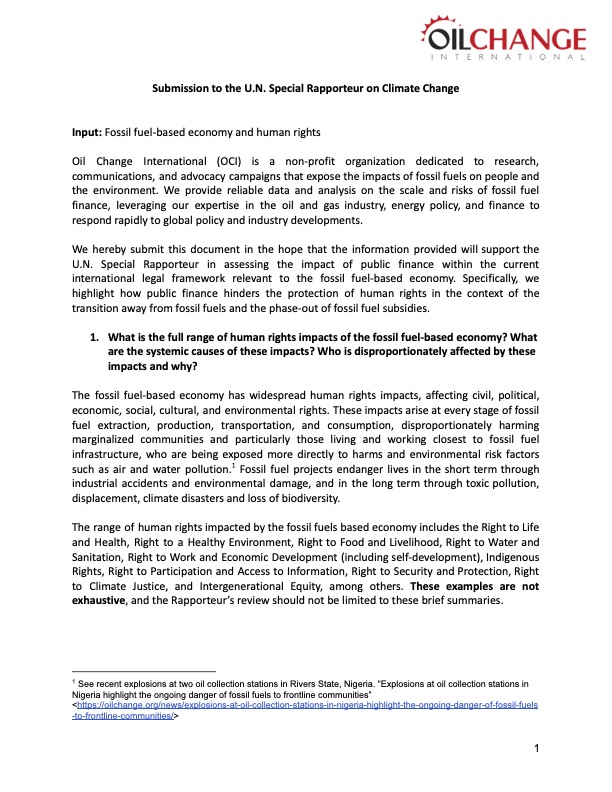
UN Submission on Fossil Fuel-Based Economy and Human Rights
Oil Change International provided input to support the U.N. Special Rapporteur in assessing the impact of public finance within the current international legal framework governing the fossil fuel-based economy.
UN Submission on Fossil Fuel-Based Economy and Human Rights Fossil Fuel-Based Economy and Human Rights
Oil Change International (OCI) provided input to support the U.N. Special Rapporteur in assessing the impact of public finance within the current international legal framework governing the fossil fuel-based economy.
Our submission highlights how public finance hinders the protection of human rights in the context of phasing out fossil fuel subsidies and transitioning away from fossil fuels:
- The fossil fuel industry negatively impacts civil, political, economic, social, cultural, and environmental rights at every stage -> extraction, production, transportation, and consumption. These harms disproportionately affect marginalized communities, particularly those living and working near fossil fuel infrastructure, exposing them to pollution, environmental degradation, and health risks.
- At a systemic level, the fossil fuel industry’s business model is incompatible with human rights. Governments and industry actors continue to approve and develop fossil fuel projects beyond what is viable for a livable climate.
- Aligning with the 1.5ºC climate goal requires an urgent phase-out of fossil fuel production and use. This is not just a necessity, it is a legal and moral responsibility of States to protect fundamental rights, including the right to life and personal integrity.
- A just transition away from fossil fuels must be guided by principles of justice, equity, and fairness, considering national capabilities and circumstances. It must prioritize:
(i) Shared prosperity, (ii) Human rights and social protection and (iii) Fair negotiations - Wealthy nations must uphold their financial commitments to Global South countries, ensuring a fair transition and investment in sustainable development pathways.
- Climate change is a global crisis that triggers State obligations under multiple legal frameworks, including international customary law, human rights law, and environmental law. States and other actors have a duty to prevent corporate abuses, including those perpetrated by fossil fuel companies.
- Gaps in domestic regulations enable corporate impunity, environmental destruction, and social injustice. Stronger legal frameworks are needed to hold fossil fuel companies accountable and ensure that human rights protections are enforced.
The transition to a clean energy future must be democratic, equitable, and centered on human rights. Governments must take decisive action to phase out fossil fuels and deliver on climate justice commitments.
